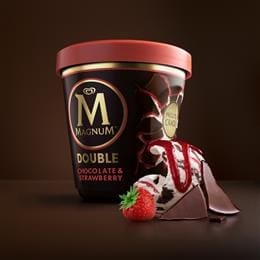Last year, the world-famous ice cream brand became the first to use SABIC’s certified circular polypropylene. Over 7 million tubs made with recycled plastic will be rolled out across Europe in 2020 and due to be launched globally from 2021 onwards.
Sittard, The Netherlands – Magnum, the world’s favorite ice cream brand, has today announced the roll out of more than 7 million ice cream tubs made with certified circular polypropylene from SABIC’s TRUCIRCLE™ initiative that uses feedstock made from recycling used, mixed plastic. The launch represented the “world’s first” tub within the ice cream industry that contains recycled plastic and that aims to contribute towards the challenge of keeping plastic waste out of the environment and in the value chain.
Magnum is the first to use recycled plastic within the ice cream industry and after a successful pilot launch in Spain, Belgium and Netherlands last year, the full roll out across all European countries is another exciting step to offer more sustainable packaging to consumers. New Magnum tubs have been developed in close collaboration of Unilever and SABIC. To be able to answer consumer’s expectations of robust packaging from Unilever’s A-brand ice cream, SABIC has developed a new polypropylene impact copolymer for frozen food packaging. SABIC’s material uses post-consumer mixed plastic as feedstock which is broken down into its molecular building blocks, to create virgin plastics which are then used to produce these new recyclable, ice cream tubs.
With more in-home consumption due to COVID-19, the introduction of these tubs and their impact on environment becomes extra relevant as the world prepares for a new future. “We are proud to be the world’s first ice cream brand to pioneer this ground-breaking technology”, says Julien Barraux, Global Magnum Vice President “Through this new approach, we hope to lead the food and refreshment industry towards a more sustainable future, paving the way to a circular economy.”
Mark Vester, Circular Economy Leader at SABIC, said: “Magnum tubs display a great collaborative effort between Unilever and SABIC, a true collaboration and innovation which drives positive change towards closing the loop on valuable, used plastics.”
By end of 2020, Magnum will use an estimated 160,000 kilograms of certified recycled plastic material.
The move is part of Unilever’s wider global packaging commitment to halve the company’s use of virgin plastic, by reducing its absolute use of plastic packaging by more than 100,000 tonnes and accelerating its use of recycled plastic by 2025. The Magnum tubs are now available in Europe and due to be launched globally from 2021 onwards.
As Magnum announced, all its packaging will soon be fully reusable, recyclable or compostable and made with post-consumer recycled material to drive the circular economy approach. By using this new approach, Magnum hopes to lead the food and refreshment industry towards a more sustainable future, paving the way to a circular economy.
SABIC’s ground-breaking TRUCIRCLE™ solutions encompasses the company’s circular materials and technologies including certified circular polymers from the chemical recycling of used, mixed plastic; certified renewable polymers from bio-based feedstock and mechanically recycled polymers. SABIC’s certified polymers are based on a mass balance approach. To secure the chain of custody the value chain parties require an ISCC PLUS certification. This widely recognized international sustainability certification scheme verifies that the mass balance accounting follows predefined and transparent rules. In addition, it provides traceability along the supply chain, from the feedstock to the final product.

